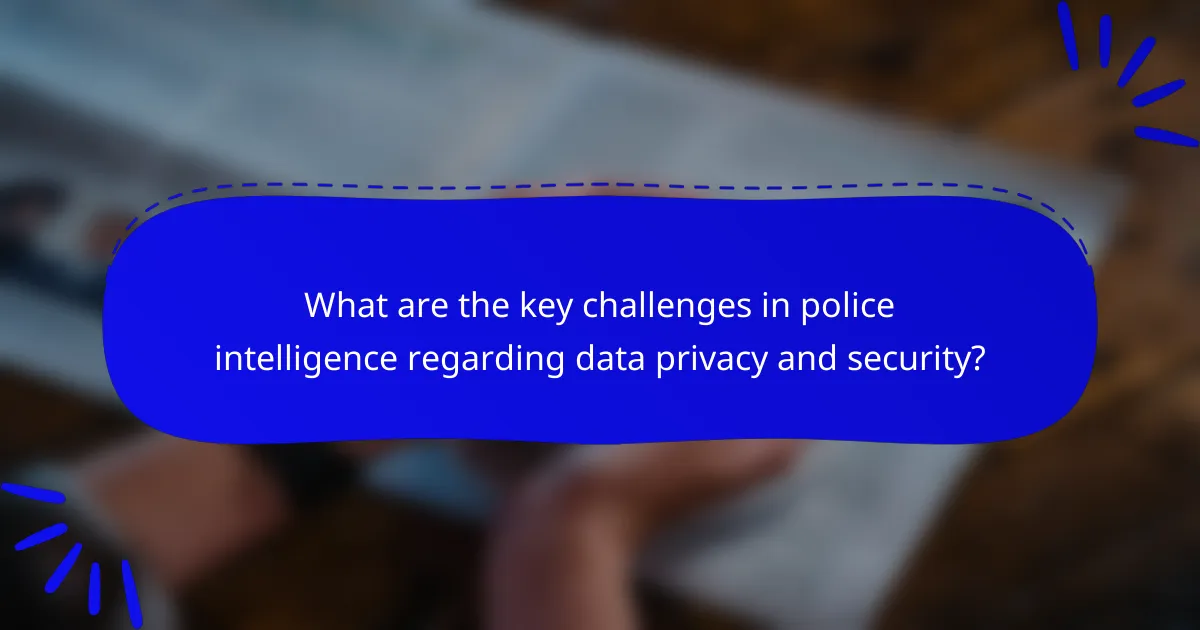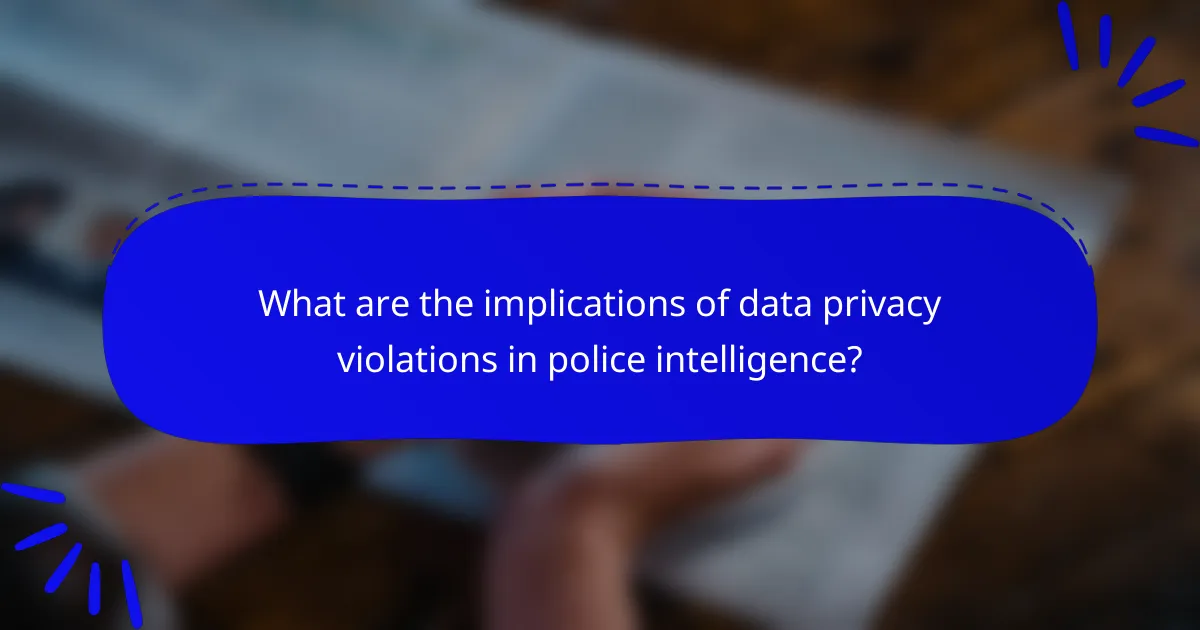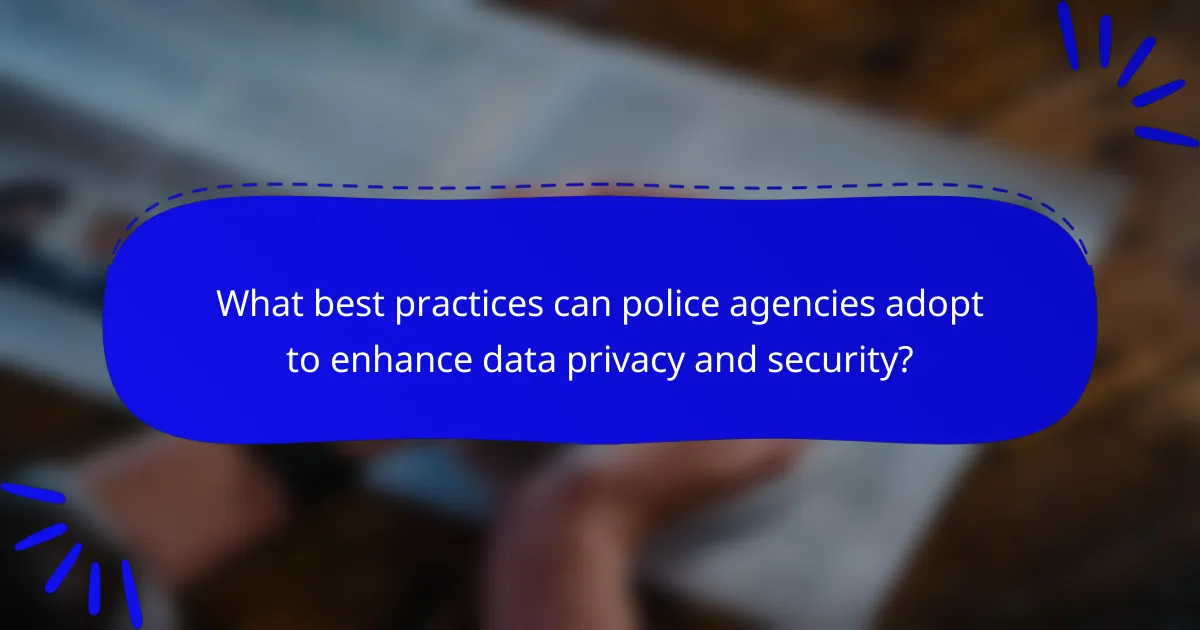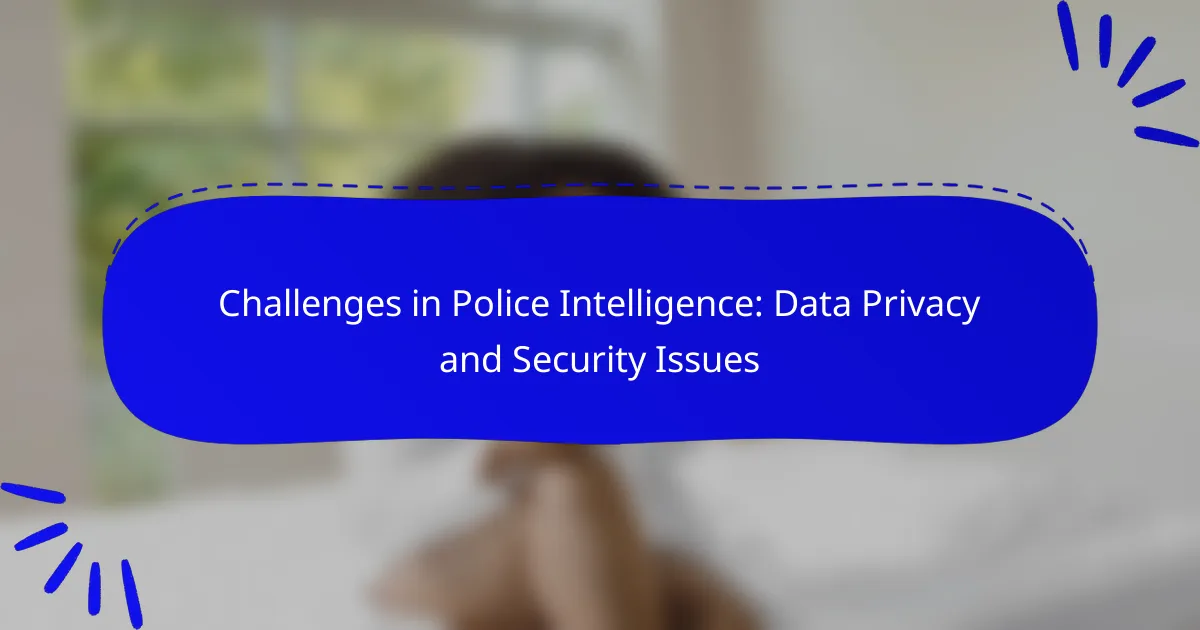
What are the key challenges in police intelligence regarding data privacy and security?
Key challenges in police intelligence regarding data privacy and security include balancing public safety with individual privacy rights. Law enforcement agencies often face scrutiny over data collection methods. They must comply with regulations like the GDPR, which limits personal data use. Cybersecurity threats also pose risks to sensitive data storage and transmission. Misuse of data can lead to breaches of trust between the police and the community. Additionally, the rapid advancement of technology complicates the ability to secure data effectively. Public awareness and concern about surveillance practices further challenge police operations. These factors collectively hinder effective policing while ensuring data privacy and security.
How do data privacy laws impact police intelligence operations?
Data privacy laws restrict police intelligence operations by limiting data collection and usage. These laws aim to protect individual privacy rights. Police must obtain proper consent or a warrant for data access. Compliance with these laws can delay investigations. Violations may lead to legal challenges and evidence exclusion. For instance, the General Data Protection Regulation (GDPR) enforces strict data handling requirements. This regulation impacts how police share and process personal information. Consequently, police agencies may need to adapt their practices to remain compliant.
What specific laws govern data collection in law enforcement?
The specific laws governing data collection in law enforcement include the Fourth Amendment, the Privacy Act of 1974, and the Electronic Communications Privacy Act (ECPA) of 1986. The Fourth Amendment protects against unreasonable searches and seizures, requiring warrants based on probable cause. The Privacy Act of 1974 regulates the federal government’s collection, use, and dissemination of personal information. The ECPA establishes standards for accessing electronic communications and stored data. These laws ensure that data collection practices respect citizens’ privacy rights while allowing law enforcement to perform their duties.
How do these laws vary across different jurisdictions?
Laws regarding data privacy and security in police intelligence vary significantly across jurisdictions. In the United States, for example, laws differ between federal, state, and local levels. The federal government has regulations such as the Privacy Act of 1974, while states may have their own specific laws, like California’s Consumer Privacy Act. In the European Union, the General Data Protection Regulation (GDPR) sets stringent rules for data handling that apply across member states.
These variations can affect how police agencies collect, store, and share data. Some jurisdictions prioritize individual privacy rights more than others. For instance, Scandinavian countries often have stricter data protection laws compared to those in Eastern Europe.
Moreover, enforcement mechanisms and penalties for non-compliance also differ. In some regions, violations may lead to severe fines, while in others, enforcement may be lax or non-existent. This patchwork of laws creates challenges for police agencies operating across borders.
What security issues are prevalent in police intelligence systems?
Police intelligence systems face several security issues. One major issue is data breaches, where unauthorized access to sensitive information occurs. These breaches can expose personal data of citizens and law enforcement personnel. Another issue is inadequate encryption, which leaves data vulnerable during transmission. Additionally, insider threats pose a significant risk, as employees with access may misuse their privileges. Furthermore, outdated software can create vulnerabilities that hackers exploit. A lack of comprehensive security protocols can lead to inconsistent protection measures across different systems. These issues highlight the need for robust security frameworks in police intelligence systems.
What types of cyber threats do police intelligence systems face?
Police intelligence systems face various types of cyber threats. These include data breaches, where unauthorized individuals access sensitive information. Ransomware attacks are also common, encrypting data and demanding payment for its release. Phishing attempts target personnel to gain login credentials. Denial-of-service attacks can disrupt system operations by overwhelming servers. Insider threats involve employees misusing their access for malicious purposes. Malware infections compromise system integrity and data security. Finally, advanced persistent threats involve prolonged and targeted cyber espionage efforts. Each of these threats poses significant risks to the confidentiality, integrity, and availability of police intelligence data.
How can these threats compromise sensitive data?
Threats can compromise sensitive data through unauthorized access and data breaches. Cybercriminals exploit vulnerabilities in systems to gain access to confidential information. Phishing attacks trick individuals into revealing personal data. Malware can infiltrate systems, allowing attackers to steal sensitive files. Insider threats arise when employees misuse their access to data. Ransomware can lock users out of their systems, demanding payment for access. Each of these methods can lead to significant data loss and privacy violations. According to the Verizon Data Breach Investigations Report, 30% of data breaches involve internal actors. This highlights the real risk posed by various threats to sensitive data.
Why is data integrity crucial in police intelligence?
Data integrity is crucial in police intelligence because it ensures the accuracy and reliability of information. Accurate data supports informed decision-making in investigations and operations. Reliable data helps build trust among law enforcement agencies and the communities they serve. Inaccurate data can lead to wrongful arrests or failed investigations. According to a study by the International Association of Chiefs of Police, 80% of law enforcement agencies reported that data quality directly impacts their operational effectiveness. Maintaining data integrity is essential for effective crime analysis and resource allocation. It also protects against data breaches that could compromise sensitive information. Thus, data integrity is foundational for effective policing and public safety.
What methods are used to ensure data accuracy and reliability?
Data accuracy and reliability are ensured through various methods. Data validation checks are commonly used to identify errors during data entry. Regular audits and reviews help maintain data integrity over time. Training personnel on proper data handling practices reduces human error. Implementing standardized data collection procedures enhances consistency. Utilizing automated data processing tools minimizes manual input mistakes. Cross-referencing data with multiple sources increases verification confidence. Data encryption and secure storage protect against unauthorized alterations. These methods collectively contribute to the overall accuracy and reliability of police intelligence data.
How can compromised data integrity affect law enforcement outcomes?
Compromised data integrity can severely hinder law enforcement outcomes. It leads to inaccurate information being used in investigations. This can result in wrongful arrests or failure to apprehend suspects. For instance, a study by the National Institute of Justice found that 40% of cases were negatively impacted by data errors. Furthermore, compromised data can undermine public trust in law enforcement. When the integrity of evidence is questioned, court cases may be dismissed. This can ultimately allow criminals to evade justice. The overall effectiveness of law enforcement agencies is diminished when data integrity is compromised.

What are the implications of data privacy violations in police intelligence?
Data privacy violations in police intelligence can lead to severe consequences. These violations undermine public trust in law enforcement agencies. When sensitive data is mishandled, it can result in unauthorized access to personal information. This access may expose individuals to identity theft or wrongful accusations. Furthermore, data breaches can hinder ongoing investigations by compromising sources and methods. Legal repercussions for police departments may arise from non-compliance with data protection laws. For instance, the General Data Protection Regulation (GDPR) imposes strict penalties for data mishandling. Overall, data privacy violations pose risks to both individuals and the integrity of police operations.
How can breaches in data privacy affect public trust in law enforcement?
Breaches in data privacy can significantly erode public trust in law enforcement. When sensitive personal information is compromised, individuals feel vulnerable. This vulnerability leads to skepticism about law enforcement’s ability to protect citizens. According to a 2021 survey by the Pew Research Center, 81% of Americans expressed concern over how their data is collected and used. Trust diminishes when people perceive that law enforcement mishandles their data. Public confidence in police effectiveness is closely tied to their perception of data security. A 2019 study published in the Journal of Criminal Justice found that data breaches negatively impacted community relations with police departments. Trust is essential for effective policing, and breaches can create long-lasting damage to this relationship.
What are the potential consequences for police agencies following a data breach?
Police agencies face significant consequences following a data breach. These consequences include loss of sensitive information, which can compromise ongoing investigations. Trust between the community and law enforcement may erode. Financial costs arise from legal fees and potential settlements. Operational disruptions can hinder police effectiveness. Additionally, there may be regulatory penalties for failing to protect data adequately. Historical data shows that breaches can lead to increased crime rates due to compromised intelligence. Overall, the ramifications of a data breach can severely impact police operations and public safety.
How can public perception be managed after such incidents?
Public perception can be managed after incidents through transparent communication. Authorities should provide timely updates about the situation. Clear explanations of actions taken can help build trust. Engaging with community leaders fosters a collaborative environment. Listening to public concerns shows responsiveness. Utilizing social media can disseminate accurate information quickly. Providing educational resources helps demystify police practices. Research indicates that transparency reduces misinformation and enhances community relations.
What role does technology play in addressing data privacy and security challenges?
Technology plays a crucial role in addressing data privacy and security challenges. It enables the implementation of advanced encryption methods to protect sensitive information. Encryption transforms data into unreadable formats, ensuring only authorized users can access it. Additionally, technology facilitates secure data storage solutions. These solutions often include cloud services with robust security measures. Furthermore, technology allows for real-time monitoring of data access and usage. This monitoring helps detect and respond to unauthorized access attempts swiftly. Artificial intelligence and machine learning also enhance threat detection capabilities. They analyze patterns to identify potential security breaches proactively. Overall, technology provides essential tools for safeguarding data privacy and enhancing security protocols in various sectors, including law enforcement.
How can advanced analytics improve data security in police intelligence?
Advanced analytics can enhance data security in police intelligence by identifying potential threats and vulnerabilities. It utilizes algorithms to analyze vast amounts of data in real-time. This capability allows for the detection of unusual patterns that may indicate security breaches. Predictive analytics can forecast potential risks based on historical data. Machine learning models can continuously improve their accuracy over time. Advanced analytics also aids in automating security protocols, reducing human error. For example, it can flag unauthorized access attempts instantly. These measures collectively strengthen the overall data security framework in police intelligence.
What technologies are currently being implemented to safeguard data?
Encryption is a key technology currently being implemented to safeguard data. It transforms readable data into an encoded format. Only authorized users with the decryption key can access the original data. This method protects sensitive information from unauthorized access. Additionally, multi-factor authentication is widely used. It requires users to provide two or more verification factors. This adds an extra layer of security beyond just a password. Firewalls are also crucial in protecting data. They monitor and control incoming and outgoing network traffic. Intrusion detection systems further enhance security. They identify and respond to potential threats in real-time. Regular software updates and patches are essential for maintaining security. They fix vulnerabilities that could be exploited by attackers. Together, these technologies create a robust framework for data protection.

What best practices can police agencies adopt to enhance data privacy and security?
Police agencies can adopt several best practices to enhance data privacy and security. First, implementing strong encryption protocols for data storage and transmission is crucial. This protects sensitive information from unauthorized access. Second, regular training for personnel on data privacy laws and cybersecurity measures is essential. Educated staff can better recognize and mitigate risks. Third, establishing strict access controls limits data access to authorized personnel only. This reduces the potential for data breaches. Fourth, conducting regular audits of data handling practices helps identify vulnerabilities. Continuous assessment ensures compliance with privacy regulations. Fifth, developing incident response plans prepares agencies for potential data breaches. This proactive approach minimizes damage and recovery time. According to the International Association of Chiefs of Police, these practices significantly improve data security and privacy in law enforcement agencies.
How can training and awareness programs improve data handling practices?
Training and awareness programs can significantly improve data handling practices by enhancing knowledge and compliance among personnel. These programs educate employees on data privacy regulations and best practices. Increased awareness reduces the likelihood of data breaches caused by human error. For instance, organizations with comprehensive training see a 45% decrease in security incidents, according to a report by the Ponemon Institute. Regular training sessions keep staff updated on evolving threats and technologies. Moreover, awareness programs foster a culture of accountability regarding data handling. Employees become more vigilant and proactive in protecting sensitive information. This ultimately leads to better overall data security and trust within the organization.
What key topics should be included in training for law enforcement personnel?
Key topics for law enforcement training should include data privacy laws and regulations. Understanding the legal framework is essential for compliance. Officers should learn about ethical considerations in data handling. This includes respecting citizens’ rights and maintaining public trust. Cybersecurity awareness is crucial due to increasing digital threats. Training should cover techniques for safeguarding sensitive information. Additionally, crisis management and de-escalation tactics are important. These skills help officers handle high-stress situations effectively. Finally, community engagement strategies should be included to foster positive relationships. This comprehensive training approach enhances overall police effectiveness and public safety.
How can ongoing education ensure compliance with data privacy regulations?
Ongoing education ensures compliance with data privacy regulations by keeping personnel informed about legal requirements. Regular training updates staff on evolving regulations like GDPR and CCPA. This knowledge helps organizations implement necessary policies and procedures effectively. Educated employees are more likely to recognize data privacy risks. They can identify potential breaches and respond appropriately. Compliance training enhances accountability and fosters a culture of data protection. Studies show that organizations with robust training programs experience fewer data breaches. Continuous education is essential for adapting to new privacy challenges and maintaining compliance.
What strategies can be employed to mitigate risks associated with data breaches?
Implementing strong data encryption is a key strategy to mitigate risks associated with data breaches. Encryption protects sensitive information by converting it into unreadable code. This means that even if data is intercepted, unauthorized users cannot access it. Regularly updating software and systems is another essential strategy. Vulnerabilities in outdated software can be exploited by attackers. Conducting employee training on cybersecurity best practices is also crucial. Educated employees are less likely to fall for phishing attacks or other social engineering tactics. Additionally, implementing multi-factor authentication adds an extra layer of security. This requires users to provide multiple forms of verification before accessing sensitive data. Regular security audits help identify potential weaknesses in data protection measures. Organizations should also establish an incident response plan. This plan ensures a quick and efficient reaction to data breaches when they occur. According to a 2022 report by IBM, organizations with an incident response plan can reduce the cost of a data breach by an average of $2 million.
What incident response plans should be in place for police agencies?
Police agencies should implement comprehensive incident response plans that include preparation, detection, analysis, containment, eradication, recovery, and post-incident review. Preparation involves training personnel and establishing communication protocols. Detection focuses on identifying potential security incidents through monitoring systems. Analysis assesses the nature and impact of the incident. Containment limits the spread of the incident to protect sensitive data. Eradication removes the cause of the incident from systems. Recovery restores systems to normal operations while ensuring data integrity. Post-incident review evaluates the response effectiveness and identifies areas for improvement. These steps align with best practices outlined by the National Institute of Standards and Technology (NIST) in their Cybersecurity Framework.
How can collaboration with cybersecurity experts enhance security measures?
Collaboration with cybersecurity experts can significantly enhance security measures. Cybersecurity experts bring specialized knowledge and skills to identify vulnerabilities. They conduct thorough risk assessments to pinpoint potential threats. Their expertise helps in implementing robust security protocols tailored to specific needs. Collaboration facilitates the integration of advanced technologies, such as encryption and intrusion detection systems. According to a study by the Ponemon Institute, organizations that engage cybersecurity experts reduce security breaches by 30%. This data underscores the effectiveness of expert collaboration in strengthening security frameworks.
What practical steps can police agencies take to ensure data privacy and security?
Police agencies can implement several practical steps to ensure data privacy and security. First, they should adopt strict data access controls. This limits access to sensitive information only to authorized personnel. Second, regular training on data protection policies for all staff is essential. This ensures that employees understand their responsibilities regarding data privacy. Third, agencies should utilize encryption for sensitive data storage and transmission. Encryption protects data from unauthorized access during storage and communication. Fourth, conducting regular audits and assessments of data security practices is crucial. This helps identify vulnerabilities and improve security measures. Fifth, police agencies must establish clear data retention policies. These policies dictate how long data is stored and when it should be securely disposed of. Finally, collaboration with cybersecurity experts can enhance overall data protection strategies. This partnership can provide insights into emerging threats and effective countermeasures.
The main entity of this article is police intelligence, specifically focusing on data privacy and security challenges. Key issues include the balance between public safety and individual privacy rights, compliance with data privacy laws like GDPR, and the impact of cybersecurity threats on sensitive data. The article explores the legal framework governing data collection, the variations in laws across jurisdictions, and the security vulnerabilities faced by police intelligence systems. Furthermore, it discusses the importance of data integrity, the implications of data privacy violations, and best practices for enhancing data protection within law enforcement agencies.
